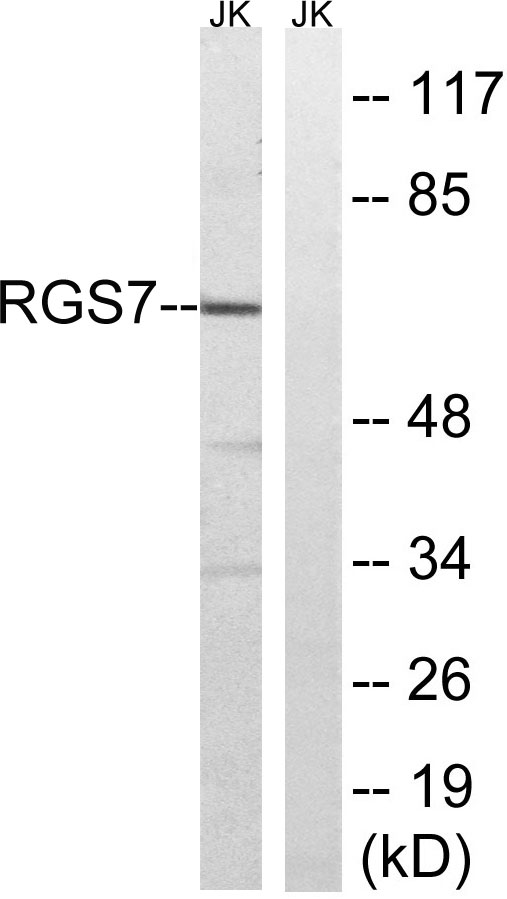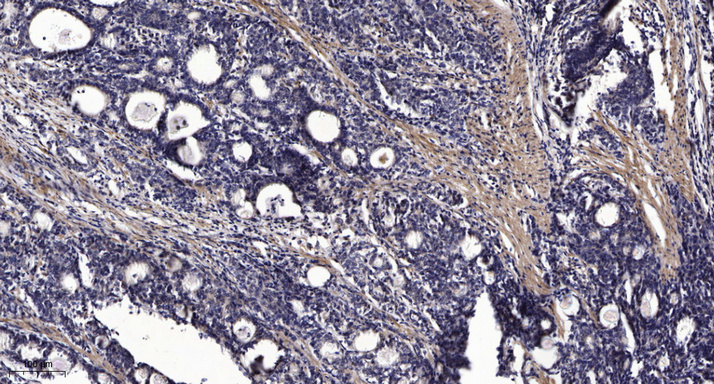RGS7 Polyclonal Antibody
- Catalog No.:YT4076
- Applications:WB;ELISA;IHC
- Reactivity:Human;Mouse;Rat
- Target:
- RGS7
- Gene Name:
- RGS7
- Protein Name:
- Regulator of G-protein signaling 7
- Human Gene Id:
- 6000
- Human Swiss Prot No:
- P49802
- Mouse Gene Id:
- 24012
- Mouse Swiss Prot No:
- O54829
- Rat Gene Id:
- 54296
- Rat Swiss Prot No:
- P49803
- Immunogen:
- The antiserum was produced against synthesized peptide derived from human RGS7. AA range:155-204
- Specificity:
- RGS7 Polyclonal Antibody detects endogenous levels of RGS7 protein.
- Formulation:
- Liquid in PBS containing 50% glycerol, 0.5% BSA and 0.02% sodium azide.
- Source:
- Polyclonal, Rabbit,IgG
- Dilution:
- WB 1:500-2000;IHC 1:50-300; ELISA 2000-20000
- Purification:
- The antibody was affinity-purified from rabbit antiserum by affinity-chromatography using epitope-specific immunogen.
- Concentration:
- 1 mg/ml
- Storage Stability:
- -15°C to -25°C/1 year(Do not lower than -25°C)
- Other Name:
- RGS7;Regulator of G-protein signaling 7;RGS7
- Observed Band(KD):
- 65kD
- Background:
- function:Inhibits signal transduction by increasing the GTPase activity of G protein alpha subunits thereby driving them into their inactive GDP-bound form. Activity on G(o)-alpha is specifically enhanced by the RGS6/GNG5 dimer. May play a role in synaptic vesicle exocytosis. May play important role in the rapid regulation of neuronal excitability and the cellular responses to short-lived stimulations.,PTM:Palmitoylated.,PTM:Phosphorylation and subsequent interaction with 14-3-3 proteins inhibits GAP activity.,similarity:Contains 1 DEP domain.,similarity:Contains 1 G protein gamma domain.,similarity:Contains 1 RGS domain.,subunit:Heterodimer with GNG5. Interacts with RGS7BP, leading to regulate the subcellular location of the heterodimer formed with Gbeta5 (By similarity). Interacts with 14-3-3 protein Tau and SNAP25BP.,
- Function:
- function:Inhibits signal transduction by increasing the GTPase activity of G protein alpha subunits thereby driving them into their inactive GDP-bound form. Activity on G(o)-alpha is specifically enhanced by the RGS6/GNG5 dimer. May play a role in synaptic vesicle exocytosis. May play important role in the rapid regulation of neuronal excitability and the cellular responses to short-lived stimulations.,PTM:Palmitoylated.,PTM:Phosphorylation and subsequent interaction with 14-3-3 proteins inhibits GAP activity.,similarity:Contains 1 DEP domain.,similarity:Contains 1 G protein gamma domain.,similarity:Contains 1 RGS domain.,subunit:Heterodimer with GNG5. Interacts with RGS7BP, leading to regulate the subcellular location of the heterodimer formed with Gbeta5 (By similarity). Interacts with 14-3-3 protein Tau and SNAP25BP.,
- Subcellular Location:
- Cytoplasm, cytosol . Cytoplasm . Cell membrane . Membrane ; Peripheral membrane protein ; Cytoplasmic side . Interaction with PKD1 promotes location at the cell membrane (PubMed:10339594). Interaction with RGS7BP promotes location at the cell membrane (PubMed:15897264). .
- Expression:
- Brain,
- June 19-2018
- WESTERN IMMUNOBLOTTING PROTOCOL
- June 19-2018
- IMMUNOHISTOCHEMISTRY-PARAFFIN PROTOCOL
- June 19-2018
- IMMUNOFLUORESCENCE PROTOCOL
- September 08-2020
- FLOW-CYTOMEYRT-PROTOCOL
- May 20-2022
- Cell-Based ELISA│解您多样本WB检测之困扰
- July 13-2018
- CELL-BASED-ELISA-PROTOCOL-FOR-ACETYL-PROTEIN
- July 13-2018
- CELL-BASED-ELISA-PROTOCOL-FOR-PHOSPHO-PROTEIN
- July 13-2018
- Antibody-FAQs
- Products Images

- Western blot analysis of lysates from Jurkat cells, using RGS7 Antibody. The lane on the right is blocked with the synthesized peptide.

- Immunohistochemical analysis of paraffin-embedded human Gastric adenocarcinoma. 1, Antibody was diluted at 1:200(4° overnight). 2, Tris-EDTA,pH9.0 was used for antigen retrieval. 3,Secondary antibody was diluted at 1:200(room temperature, 45min).



